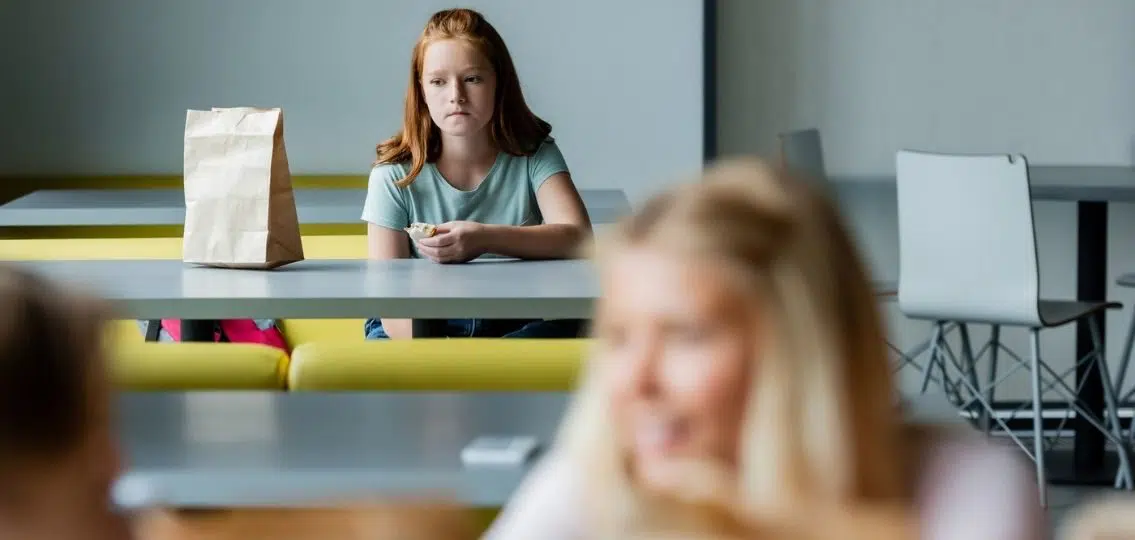On the night before my daughter’s highly anticipated camp reunion, posts of her beloved bunkmates at a sleepover party started popping up in her Instagram feed. They had captions like, “Don’t you wish you were part of our squad?”

What?
She hadn’t been invited. She came to me, devastated, asking if I thought she should still go to the reunion.
Honestly, it was a tough call. All I wanted to do was chew out the host parents and send in a squad of my own (although the parents were probably clueless about the situation).
When it comes to feeling left out (FOMO), even our most well-adjusted adolescents struggle with that all-consuming angst when they discover that their peers are doing something, or are in the know of something, and they’ve been left out.
Yes, with teens (and with all of us) FOMO has always existed, but it’s going into overdrive thanks to real-time digital updates.
This is particularly due to trending social channels like Snapchat and Instagram.
So, how do you come of age when an inanimate object with a screen is your looking glass and fifth limb? How do you navigate the potentially toxic social world? How do you deal with 24/7 evidence of being left out?
FOMO is actually about coping with our new social reality, one that puts everyone’s lives in a public square, ripe for commentary and judgment. Our kids may be troubled by an actual event, an exclusive selfie, or just the impression that the lives of their “friends” are much better than their own.
In any case, we need to teach them life skills that help them build inner strength, confidence, and mastery over socially manipulative situations. They need skills that will prevent others from getting the best of them.
According to author and internationally recognized parenting expert Rosalind Wiseman, “Feeling left out sucks. But, as parents, we need to affirm our kids’ feelings. We need to listen to them, support them, sit with them, and guide them.”
We may be inclined to offer our kids platitudes like, “It doesn’t mean anything in the long run,” or, “Popularity is temporary and unimportant.” But teens live entirely in the now. Imparting our time-tested wisdom about the future does little to help them cope in the moment.
Instead, let them know it is normal and human to feel mentally deflated when they are left out. Be there to engage them in conversation, build up confidence, and work out the best approach to resolution.
According to Shelley Zalis, founder of The Girls’ Lounge and champion of the movement #ConfidenceIsBeautiful, “It’s all about instilling confidence in your teen so they realize that the action is where they are. Instead of focusing on what everyone else is doing, help your teen create her own space. Help her appreciate what makes her special and unique.”
“I like to call everyone’s social media feeds their ‘Highlight Reels,’” says Lauren Galley, teen mentor and founder of Girls Above Society. “We all get excited to post our adventures and accomplishments. But I really can’t express enough the importance of thinking before we post. There are always going to be those mean girls who leave us out intentionally, or try to embarrass us. But we can never let another person place value on our self-worth.”
Research from the CNN study, #Being Thirteen: Social Media and the Hidden World of Young Adolescents’ Peer Culture, finds that, “Young adolescents care deeply about being included by peers, and at this developmental stage, most have one peer group on which they stake their souls: peers at school. If they see something on social media suggesting that they are not included in this group, the stakes are high and young adolescents can quickly become anxious and desperate.” Study data shows that, “one in five (13-year-olds) checks social media in order to make sure that no one is saying anything mean about them. More than one-third check to see if their friends are doing things without them.”
How about we reclaim and rename the abbreviation FOMO. Let’s try to turn it into Friends Of My Own. Next time your tween or teen tells you that they just saw a group of classmates on Snapchat laughing it up, remind them of this substantive and meaningful form of FOMO. Encourage them to embrace their genuine friendships, to cherish those friends that they can trust and confide in.
Ultimately, I did not send in a squad of my own and my daughter did go to her camp reunion. But she was disappointed that her friends spent the majority of the time snapping selfies and posting on their social channels. My daughter was able to offer this insight:
“The image that people portray on social media is an idealized, exaggerated, and perfect version of what’s actually happening. That is why friends shouldn’t feel left out when they see other friends having fun in pictures on Snapchat, Facebook, or Instagram. The picture only shows one moment and doesn’t represent the whole experience.”
As parents, our mandate is to love and protect our children—to be their safe haven. But we also need to raise our kids with a strong core of self-esteem so they can recover from whatever screen gets in the way.
8 Strategies for When Your Teen Has FOMO
1. Build self-esteem.
Tell your teens often that they are special and that you are proud of them.
2. Always affirm their feelings.
Let them know it is normal and human to feel sad, upset, embarrassed, jealous, etc. when they are left out or humiliated on social media.
3. Work through a solution.
Be there to engage them in a conversation to work things through. Include them in deciding the best approach and solution.
4. Create a distraction.
Make plans with your teens to do things that they love and are good at. Maybe a sporting event, cooking class, movie night. When they are busy and happy, they are less apt to worry about what others are doing.
5. Offer a different perspective.
Remind them that sometimes things happen with no pre-meditation or scheming to leave them out. The event or photo just happened.
6. Encourage phone-free socializing.
Encourage teens to put down their phones when they are in a social situation and have them ask their friends to do the same.
7. Have a no photo-posting rule.
If your son or daughter has only invited a short list of friends to an event, ask that they don’t post any photos on social media.

8. Empower your teen to be an upstander.
Empower them to reach out to a friend who may be hurting someone else through social media and ask that friend to stop.



